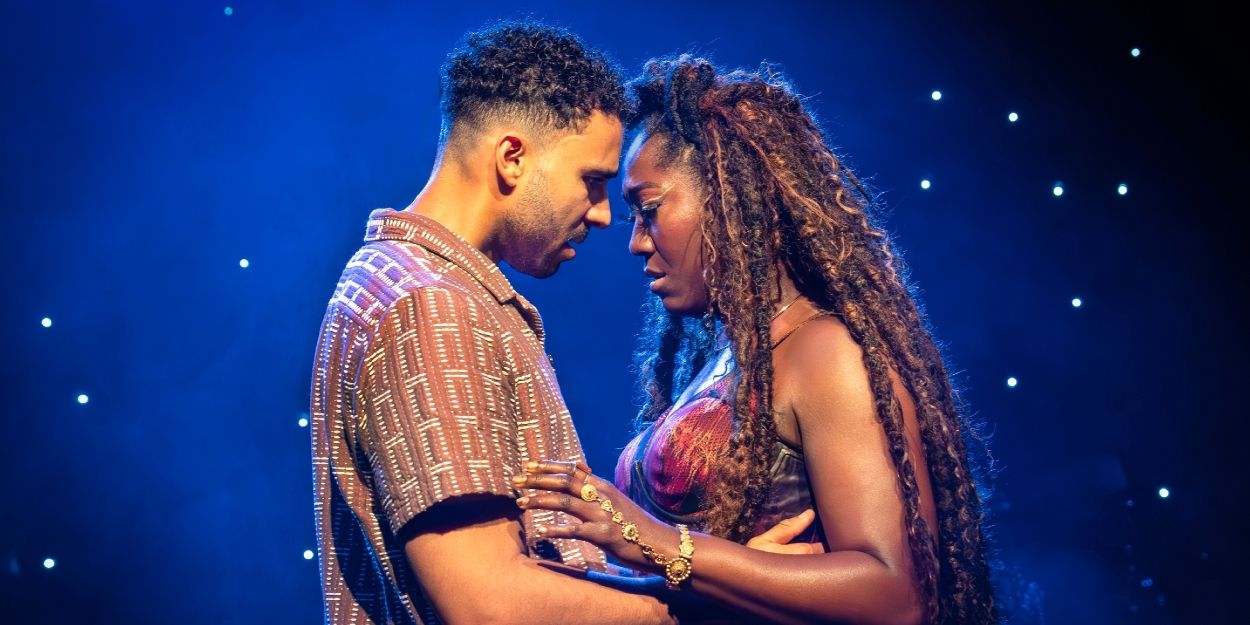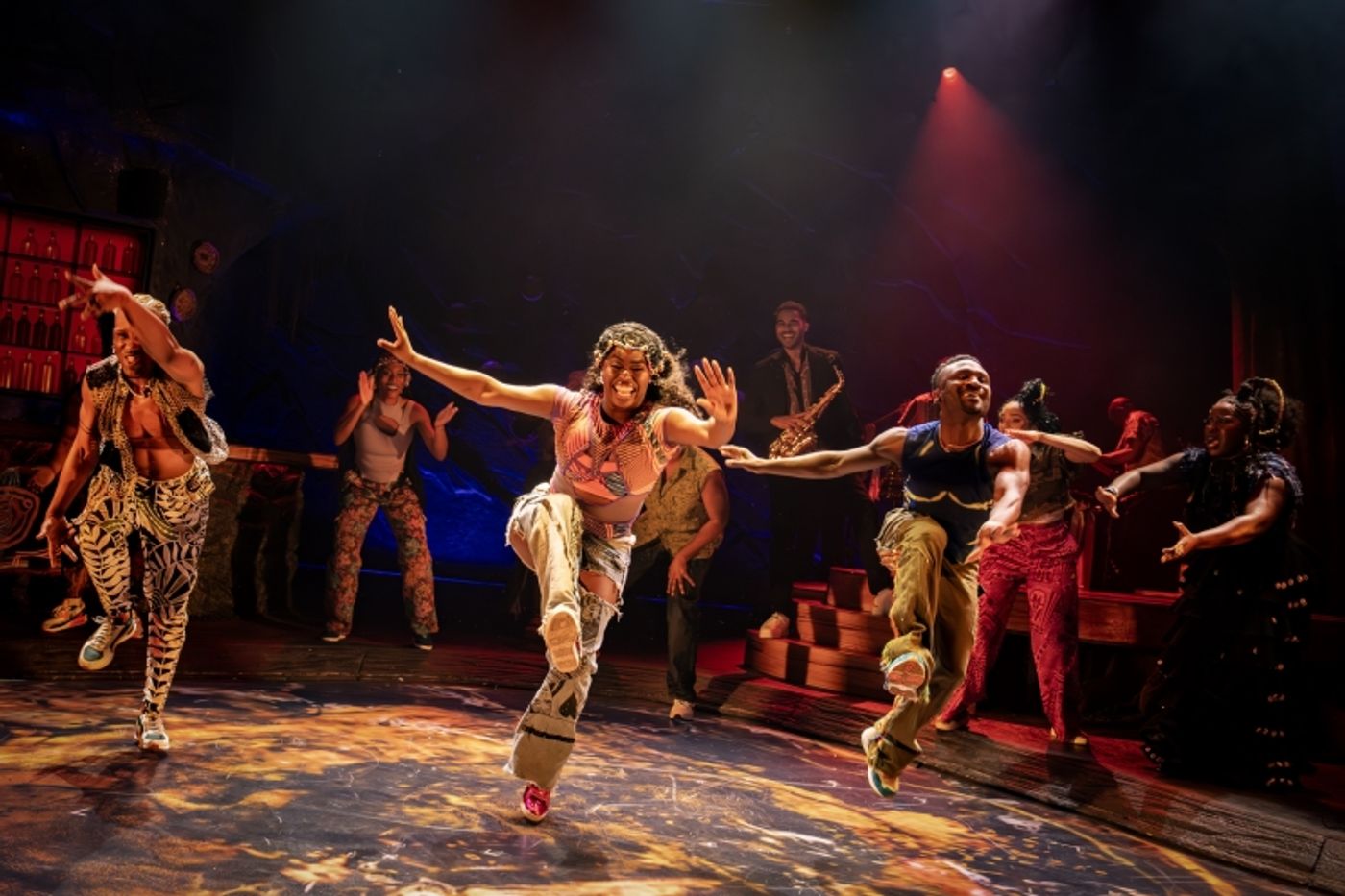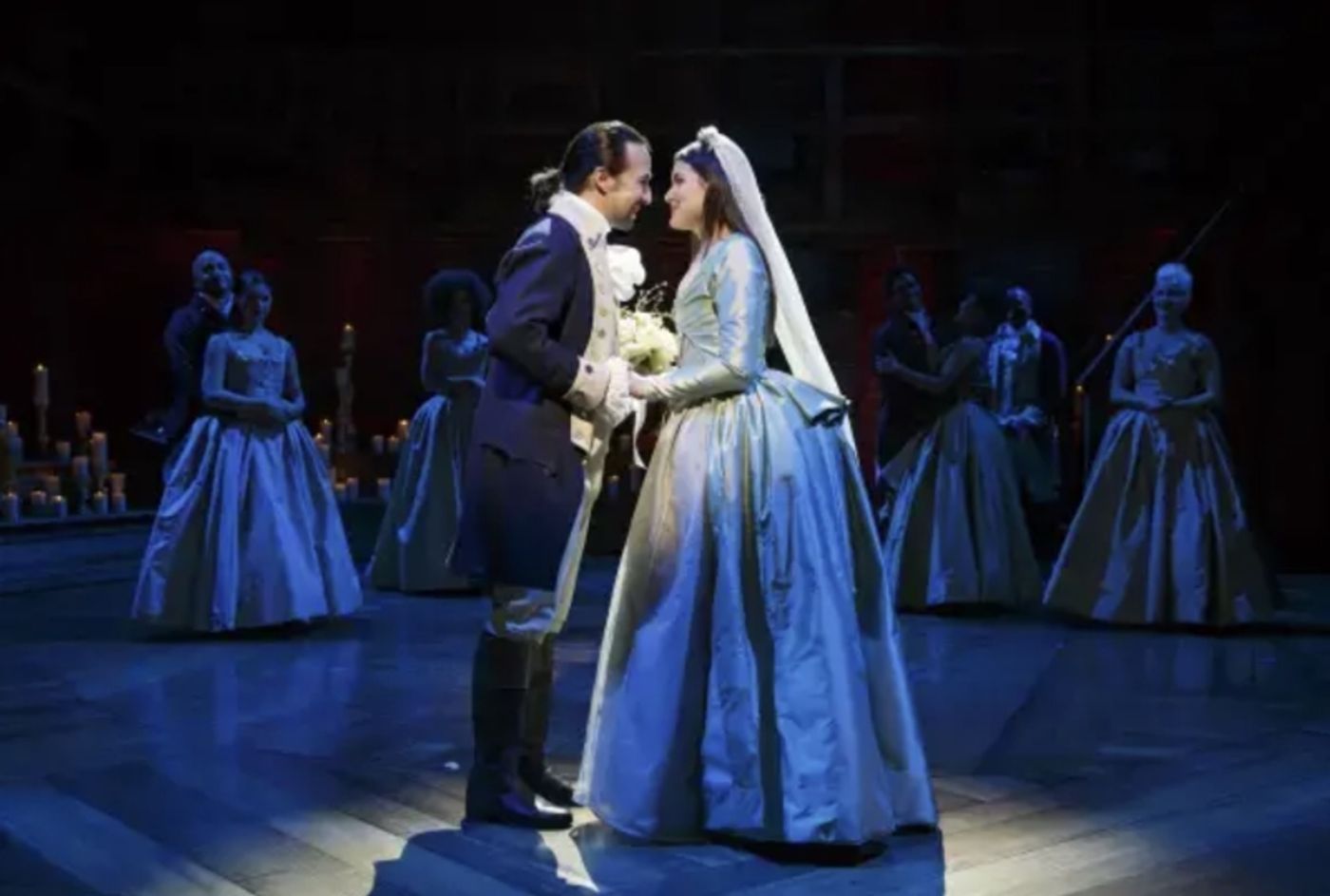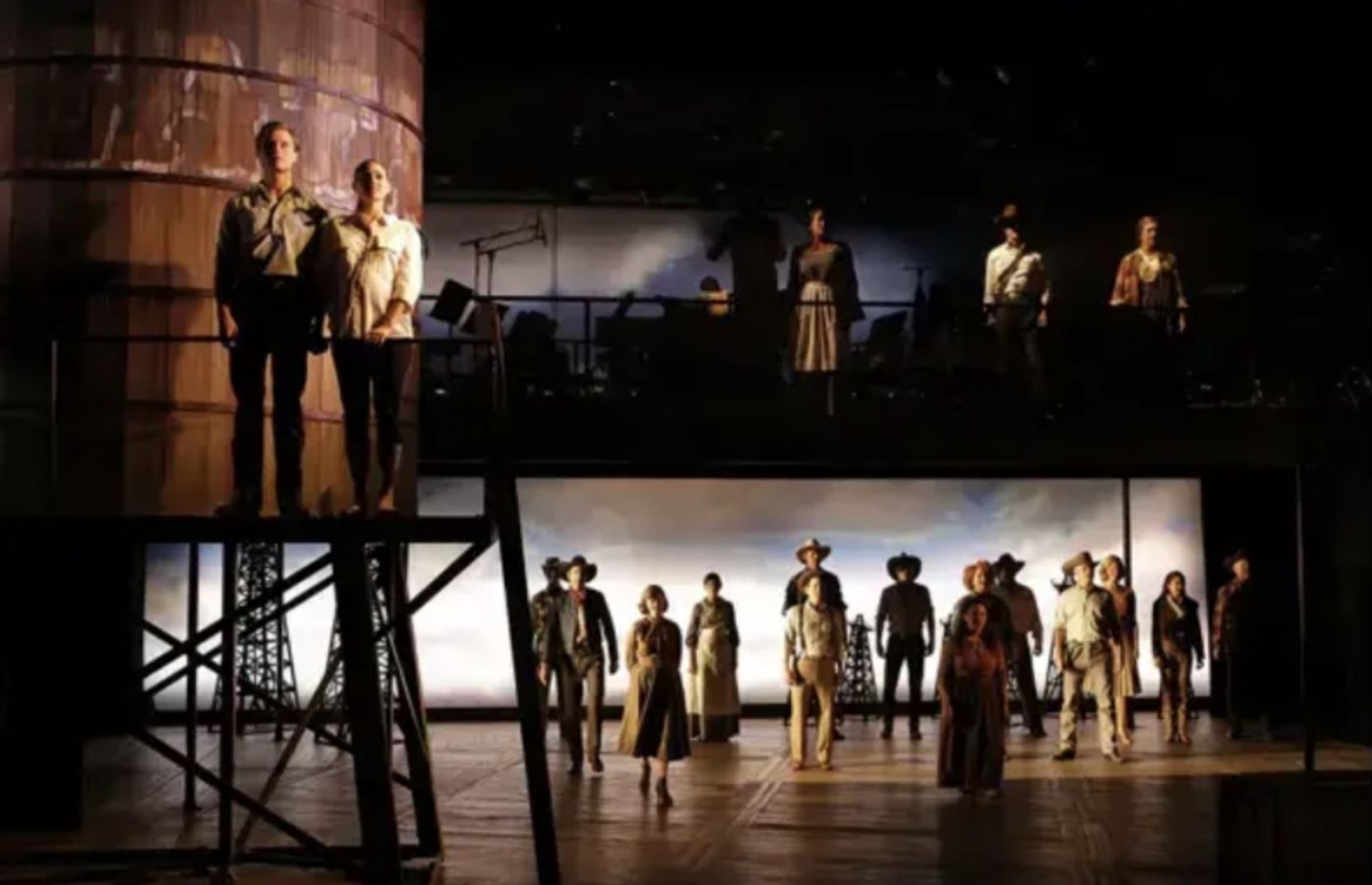What is the History of New Musicals at the Public Theater?
Goddess runs through June 8, 2025 at the Public Theater.

Do you have a burning Broadway question? Dying to know more about an obscure Broadway fact? Broadway historian and self-proclaimed theatre nerd Jennifer Ashley Tepper is here to help with Broadway Deep Dive. BroadwayWorld is accepting questions from theatre fans like you. If you're lucky, your question might be selected as the topic of her next column!
Submit your Broadway question here!
This time, the reader question was: What is the history of new musicals at The Public Theater?
The new musical Goddess can currently be seen in its New York premiere production at The Public Theater on Lafayette Street. Directed by the Public’s associate artistic director and resident director Saheem Ali, who is currently Tony Award-nominated for directing Buena Vista Social Club, Goddess is playing at the Public’s largest space by capacity, the Newman Theatre. The show, about a nightclub singer in Kenya and her impact on an aspiring politician, stars Tony Award nominee Amber Iman (Lempicka) and Austin Scott, recently of Girl From The North Country, in those two central roles.
Ali also wrote the book of Goddess, with additional book material by James Ijames. (Jocelyn Bioh was working on the book prior to Ijames, but departed the production in March.) The score is by Michael Thurber, who has composed scores for several Shakespeare in the Park productions. Goddess has been many years in the making; Ali was first inspired to create a show about Marimba, the goddess of music, set in his homeland of Kenya, in 2007. In the story of Goddess, Marimba becomes the singer Nadira, who comes down to Earth, specifically to the club Moto Moto, to learn what it’s like to love. Goddess boasts a vibrant, thrilling score, performed by a cast of 20.

Goddess joins the legacy of Public Theater musicals that includes several of the most successful musicals in history. Three major landmarks, Hair, A Chorus Line, and Hamilton, all began their lives in New York at The Public Theater. The Public, founded by the legend Joe Papp, was initially created as the Shakespeare Workshop in 1954. It quickly became a major force in New York theatre, a non-profit presenting the work of new playwrights, Shakespeare in the Park, and more. The Public now boasts five theater spaces in their hub near Astor Place plus Joe’s Pub, their cabaret space, and the Delacorte Theatre in Central Park. The Public Theater building was initially the Astor Library, built in the mid-19th century, which was the first free public library for New Yorkers. In 1920, it was taken over by the Hebrew Immigrant Aid Society and became a shelter for Jewish immigrants and refugees. By the mid-1960s it had fallen into disuse and was at risk of being demolished, before Papp and the Public stepped in to save it. The building is now landmarked.
Hair was the Public’s first musical. In 1967, Papp opened the Public’s space on Lafayette with Hair, which was presented at the Anspacher Theatre. In addition to the Newman where Goddess is currently playing and the Anspacher where Hair premiered, the Public also contains the Shiva, the Martinson, and LuEsther Hall. Hair was the perfect musical to open the Public; with its subversive political statements, modern rock score, and characters that reflected the youth community of the 1960s with authenticity, Hair attracted a new audience to the theater and pushed forward the art form.
In 1968, Hair transferred to Broadway where it ran for 1,750 performances. The Public’s musical triumph of the next decade ran even longer. Papp granted director Michael Bennett the Public for a workshop of an original musical about dancers that was developed into A Chorus Line. The show became the longest running Broadway production of all time (until its record was surpassed by Cats in 1997), setting up at the Shubert from 1975 to 1990 following a Public premiere at the Newman in 1975. A Chorus Line impacted the way that musicals were developed and thrilled audiences with its relatable characters, contemporary score, and dynamic direction and choreography.
The next time that the Public saw a new musical of theirs make the leap from downtown splash to uptown mega-hit was 40 years later with Hamilton. The Lin-Manuel Miranda masterwork opened at the Newman in 2015 and is currently in its 9th year on Broadway. The show, which tells the story of founding father Alexander Hamilton through rap, R&B, hip hop, and other contemporary music genres put a diverse cast of actors on stage to claim the story for their own. Like Hair and A Chorus Line before it, Hamilton made a new generation of young people excited about the theatre.

Of course, the Public has boasted many impactful musicals that were not Hair, A Chorus Line, or Hamilton. Many have moved to Broadway or to commercial runs off-Broadway and had successful lives in regional productions and licensing. The Public, from its first era under the auspices of Joe Papp to the current leadership under Oskar Eustis, has always prioritized elevating the voices of underrepresented artists. Many of The Public Theater’s musicals have employed writers from underrepresented groups, spoken to marginalized communities, and spotlit themes of political and social import.
Musicals that have transferred to Broadway and won the Tony for Best Musical following their Public Theater run, besides for A Chorus Line and Hamilton, are Two Gentlemen of Verona (1971), The Mystery of Edwin Drood (1985), and Fun Home (2012). Two Gentlemen of Verona and The Mystery of Edwin Drood opened at the Delacorte in Central Park as part of the Shakespeare in the Park season before moving downtown to midtown. The Delacorte has a capacity of about 1,800 so while the high octane Shakespeare adaptation and the murder mystery whodunit both started off-Broadway, they began life on a large scale. Fun Home had the opposite Public Theater journey. The adaptation of Alison Bechdel’s graphic novel about coming-of-age as a lesbian raised in a funeral home with a dysfunctional family started with a public workshop at the Public Lab for only 99 audience members per performance. There was a full production at the Public’s Newman Theatre in 2012 which has 299 seats before Fun Home moved to Broadway.
When the Public’s Fun Home moved to Broadway, one of the ways that it made history was that it marked the first time a musical entirely written by women won the big prize of Best Musical. Jeanine Tesori and Lisa Kron also took home the prize for Best Score, marking the first time a female writing team won in that category. The Public Theater has a long history of giving women a platform for their musicals. The prolific Elizabeth Swados who wrote in a slew of unconventional styles had a creative home at the Public. Her opus about unhoused youths, Runaways, opened at the Public in 1978 before moving to Broadway. She also penned Alice in Concert (1980), a version of Alice in Wonderland that starred Meryl Streep, The Haggadah, a Passover Cantata (1980), Lullabye and Goodnight (1982), and Jonah (1990), which all premiered at the Public.
Musical theater’s longest running female writing team, Gretchen Cryer and Nancy Ford, had a significant triumph at the Public with their I’m Getting My Act Together and Taking It On The Road (1978). The original musical about a singer-songwriter who is going through a divorce from a husband who doesn’t want an equal in marriage and dealing with a manager who doesn’t want her to show her age or her angry side reflected feminist struggles at the time. I’m Getting My Act Together… opened up conversations about the role of women in society as the lead character also reflected on her own demons and desires. Joe Papp championed the show and it continued on to a commercial off-Broadway run following its time at the Public and later spawned a sequel.
A more extreme feminist manifesto at the Public came from Myrna Lamb, who wrote what is considered the first major women’s liberation musical, Mod Donna (1970). The show opened at the Public in 1970 with book and lyrics by Lamb and music by Susan Hulsman Bingham. Mod Donna was an indictment of the toxicity of marriage told via a tale about a woman who is murdered after sleeping with a married couple. Lamb’s work had a unique tone, which she continued to use as the Public premiered her show Apple Pie (1976), about a woman who escapes Hitler’s Germany and then finds the United States just as oppressive. And most recently, the Public championed Suffs (2022), Shaina Taub’s musical about the suffragettes, which also found her making history on Broadway as the first woman to win both Best Book and Best Score Tony Awards on her own.
Neither Mod Donna nor Apple Pie received a cast recording. This is a shame, since it means the shows have not traveled forward to new generations as much as they might have otherwise. Since musicals at the Public are worthwhile and vital, one wishes that each of them could have received a cast recording so we could hear them today. Other Public musicals that had prominent cast and creatives, interesting plot lines, and a place in history that are relatively forgotten because they were not memorialized on an album include Kid Champion (1975), Lenny and the Heartbreakers (1983), The Knife (1987), Romance in Hard Times (1989), Up Against It (1989), and The Petrified Prince (1994). Kid Champion had a score by Jim Steinman and featured Christopher Walken in the title role. Walken won an Obie Award for his performance as a major rock star experiencing a fall from grace. Lenny and the Heartbreakers was billed as a barrier-breaking hybrid between theater, opera, music, and dance. The Knife, which the current Broadway show Smash has an in-joke about, told the unexpected story about a middle-aged husband and father of three who suddenly decides to go under the knife and transition to life as a woman; Mandy Patinkin starred. Romance in Hard Times is one of the only major Bill Finn musicals that didn’t receive a cast recording; the show starred Lillias White as a woman who refuses to give birth during the Great Depression until the world becomes a better place. Up Against It was a foray into the genre of musical theatre for the musician and singer-songwriter Todd Rundgren. The show was an adaptation of the screenplay that was almost the Beatles’ follow-up film to Help!; Roger Bart and Alison Fraser were among the cast. And finally, The Petrified Prince is one of The Public Theater musicals with the most illustrious lineup of participants that went unrecorded. The Hal Prince-directed musical, based on an unproduced Ingmar Bergman screenplay, had a score by Michael John LaChiusa, Garth Drabinsky involved as commercial producer, and a cast that included Marilyn Cooper, Jane White, Daisy Prince, Loni Ackerman, Timothy Jerome, and many others.

Of course, Rundgren is far from the only mainstream musical artist to work on a new musical at the Public. Most recently, Alicia Keys spent time at the Newman working on Hell’s Kitchen (2023) before its Broadway transfer. The show right before that in the Newman was The Harder They Come (2023), which put on stage songs by Jimmy Cliff to tell a story set in Jamaica based on the film of the same name. In 2018, Girl From the North Country utilized Bob Dylan’s songs to dramatize a bleak tale of the Great Depression. Here Lies Love found David Byrne and Fatboy Slim developing their immersive musical about Imelda Marcos at the Public in 2013 and 2014, prior to Broadway.
And on the flip side, our homegrown musical theatre creators have developed some of their most risk-taking shows at the Public. In addition to developing Fun Home with collaborator Lisa Kron at the Public, Jeanine Tesori also premiered Caroline or Change (2003), written with Tony Kushner and Soft Power (2019), written with David Henry Hwang there. The late Michael Friedman premiered his masterwork The Fortress of Solitude (2014), written with Itamar Moses, at the Public, as well as his great American statement, Bloody Bloody Andrew Jackson (2010), written with Alex Timbers and his musical about climate change, The Great Immensity (2014), written with Steve Cosson. George C. Wolfe’s time as artistic director of the Public from 1993 to 2004 found him developing multiple groundbreaking pieces, including Bring in ‘Da Noise, Bring in ‘Da Funk (1995), which he conceived, directed, and contributed lyrics to. One of Adam Guettel’s earliest works, Saturn Returns (1998), created with Tina Landau and Ted Sperling, premiered at the Public, and one of Stephen Sondheim’s final works, Road Show (2008), created with John Weidman, premiered at the Public. Stew and Heidi Rodewald created the beloved musical Passing Strange (2007), a semi-autobiographical coming-of age tale about a young Black man growing as an artist. They returned to the Public in 2016 for The Total Bent, which incorporated similar themes and musical genres this time in a completely fictional story about a brilliant young songwriter breaking away from his gospel star father.
LaChiusa’s many works created with the Public include not only The Petrified Prince and The Wild Party which premiered on Broadway, but also works as divergent as See What I Wanna See (2005) and Giant (2012). The five-hander See What I Wanna See dramatized three separate stories by Ryūnosuke Akutagawa and was originated by a cast including Idina Menzel and Mary Testa. Giant was epic in scope, based on the Edna Ferber novel about a family in Texas through several decades of the early 20th century; the cast was led by Brian d’Arcy James and Kate Baldwin. LaChiusa gave also gave life to two musicals that speak to each other and function as companion pieces which premiered more than two decades apart. First Lady Suite, a musical about several of America’s first ladies opened in 1993 at the Shiva and First Daughter Suite, about several daughters of American presidents premiered in 2015 at the Anspacher.

The Public Theater has often addressed war on its stages, in both plays and musicals. In addition to Hair and Hamilton, some of its new musicals that have addressed war have included More Than You Deserve (1973), The Human Comedy (1983), and Venice (2013). More Than You Deserve was a commentary on Vietnam and had a score by Jim Steinman; its title song was later released by cast member Meat Loaf as a single. The Human Comedy is a hidden gem of musical theatre that adapts the small town life of William Saroyan’s original novel set during World War II to the stage, with book and lyrics by William Dumaresq and music by Hair’s Galt MacDermot. Venice was the tale of a futuristic fictional city at war which starred Leslie Odom Jr. and Uzo Aduba when it premiered in 2013.
Immigration has been another frequent topic on Public stages, which is fitting given the building’s history. In 2018, Miss You Like Hell told the relevant and heartbreaking story of a mother and daughter who are separated because of immigration laws; the mother is an undocumented Mexican immigrant in this musical by Quiara Alegría Hudes and Erin McKeown. In The Visitor, which opened in 2021, Tom Kitt, Brian Yorkey, and Kwame Kwei-Armah adapted the story from the film of the same name about Middle Eastern immigration and identity in post-9/11 New York City.
LGBTQ+ artists and themes have proliferated on the Public’s stages since the Public opened. Some of the musicals that have reflected this are Radiant Baby (2003), February House (2012), and Southern Comfort (2016). Radiant Baby was a bio-musical about the life and work of artist Keith Haring, and February House also told the story of historic artists, this time those who lived in a communal house in Brooklyn in the 1940s including Carson McCullers and Gypsy Rose Lee. Meanwhile, Southern Comfort was also based on real humans, this time not artists specifically but a transgender man in his last year of life and the community who surrounds him. The show was based on a 2001 documentary of the same name.
Musical revivals don’t often take place on Lafayette Street but under the auspices of the Public, several revisals, revivals, and Shakespeare musical adaptations have lit up the Delacorte, from The Pirates of Penzance in the 1980s to the 2010s Hair revival to new takes on Shakespeare works like Love’s Labour’s Lost (2013) with a score by Michael Friedman and As You Like It (2012) with a score by Shaina Taub. While the Delacorte more often programs revivals like On the Town (1997) or Into The Woods (2012) instead of new musicals, we did see the New York City premiere of the stage musical version of Hercules there in 2019.
Of course the Public has presented numerous works adapting classics besides for Shakespeare. These have included 1971’s Wedding of Iphigenia and Iphigenia in Concert, a new take on the family drama by Euripides featuring multiple Iphigenias from Nell Carter to Marta Heflin to Andrea Marcovicci as well as 1989’s Songs of Paradise, a part English and part Yiddish adaptation of stories from the Old Testament written by Rena Berkowicz Borow, Miriam Hoffman, and Rosalie Gerut.
This piece is thorough but not exhaustive as far as musicals that have premiered as part of the rich history of The Public Theater.



